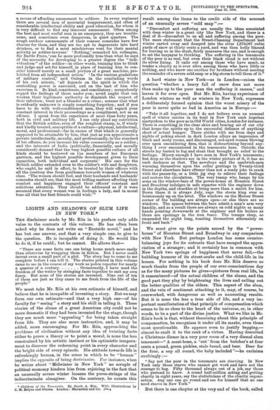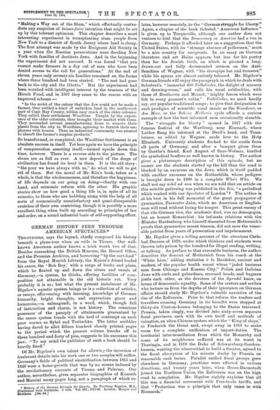THE disclaimer made by Mr. Riis in his preface only
adds value to the contents of this volume. He has often been
asked why he does not write an " Eastside novel," and he has but one answer, and that a very simple one, to give to the question. He is incapable of doing it. He would like to do it, if he could; but he cannot. He allows that— "There are some facts one can bring home much more easily than otherwise by wrapping them in fiction. But I never could invent even a small part of a plot. The story has to come to me complete before I can tell it. The stories printed in this volume came to me in the course of my work as police reporter for nearly
a quarter of a century Occasionally, I have used the freedom of the writer by stringing facts together to suit my own fancy. But none of the stories are invented. Nine out of ten of them are just as they came to me fresh from the life of the people."
We must take Mr. Riis at his own estimate of himself, and
believe that he is incapable of inventing a story. But we may form our own estimate—and that a very high one—of his faculty for " seeing " a story and his skill in telling it. These stories of the slums of a great American city could not be more dramatic if they had been invented for the stage, though they are much more " appealing " for being taken straight from life. They are also more instructive, and, it may be added, more encouraging. For Mr. Riis, approaching the
problems of civilisation without any idea of twisting facts either to prove a theory or to point a moral, is none the less constrained by his artistic instinct or his optimistic tempera- ment to discover the redeeming point in every character and the bright side of every episode. His attitude towards life is refreshingly human, in the sense in which to be " human " implies the opposite of being doctrinaire. For instance, when he writes about "Midwinter in New York" no scruple of political economy hinders him from rejoicing in the fact that an unusually severe winter loosens the purse-strings of the indiscriminate almsgiver. On the contrary, he counts this * Ch45ro5 of as Tenements. By Jacob A. Bits. With Illustrations by C. N. Belyea and Others. London ; Macmillan and Co. "Discomfort and suffering are usually the ideas associated with deep winter in a great city like New York, and there is a deal of it—discomfort to us all and suffering among the poor. The mere statement that the Street-Cleaning Department last winter carted away and dumped into the river 1,679,087 cubic yards of snow at thirty cents a yard, and was then hotly blamed for leaving us in the slush, fairly measures the one, and is enough to set the taxpayer to thinking. The suffering in the tenements of the poor is as real, but even their black cloud is not without its silver lining. It calls out among those who have much, as tender a charity as is ever alive among those who have little or nothing, and who know one another for brothers without needing the reminder of a severe cold snap or a big storm to tell them of it.'
A hard winter in New York—as in London—raises the question "whether a heavy fall of snow does not more than make up to the poor man the suffering it causes," and leaves it for ever open. But Mr. Riis, having experience of London winters as well as winters in New York, expresses a deliberately formed opinion that the worst misery of the poor is never quite so bad in America as in Europe :— " Take it all together, and I do not believe even an unusual spell of winter carries in its trail in New York such hopeless martyrdom to the poor as in Old World cities, London for instance. There is something in the clear skies and bracing air of our city that keeps the spirits up to the successful defiance of anything short of actual hunger. There abides with me from days and nights of poking about in dark London alleys an impression of black and sooty rooms, and discouraged, red-eyed women blowing ever upon smouldering fires, that is disheartening beyond any- thing I ever encountered in the tenements here. Outside, the streets lay buried in fog and slush that brought no relief to the feelings. Misery enough I have seen in New York's tenements; but deep as the shadows are in the winter picture of it, it has no such darkness as that. The newsboys and the sandwich-men warming themselves upon the cellar gratings in Twenty-third Street and elsewhere have oftener than not a ready joke to crack with the passer-by, or a little jig step to relieve their feelings and restore the circulation. The very tramp who hangs by his arms on the window-bars of the power-house at Houston Street and Broadway indulges in safe repartee with the engineer down in the depths, and chuckles at being more than a match for him. Down there it is always July, rage the storm king ever so boisterously up on the level. The windows on the Mercer Street corner of the building are always open—or else there are no windows. The spaces between the bars admit a man's arm very handily, and as a result there are always on cold nights as many hands pointing downwards at the engineer and his boilers as there are openings in the iron fence. The tramps sleep, so suspended the night long, toasting themselves alternately on front and back."
We must give up the points scored by the " power- house " of Houston Street and Broadway in any comparison with New York. But perhaps London has some counter- balancing joys for its outcasts that have escaped the appre- ciation of a stranger; and it certainly has in common with New York two springs of happiness that never fail,—the bubbling humour of its street-arabs and the child-life in its homes. For nothing in his book does Mr. Riis deserve so much thanks from the people of our over-conscientious day as for the many pictures he gives—pictures from real life, be it remembered—of the actual children of the slums, and the good part they play by brightening the lives and calling out the better qualities of the elders. This aspect of the slum, and the vein of sentiment attaching to it, may, of course, be overworked, with dangerous as well as nauseating results. But it is none the less a true side of life, and a very im- portant manifestation of that principle of compensation which seems to lie so close to the heart of the universe, or, in other words, to be a part of the divine justice. What we like in Mr. Riis's book is that, without theorising about this principle of compensation, he recognises it under all its masks, even those most questionable. He appears even to justify begging,— almost to exalt it to the rank of a virtue. Having described a Christmas dinner in a very poor room of a very dismal slum tenement—" A meat-bone, a ' cut ' from the butcher's at four cents a pound, green pickles, stale bread, and beer. Beer for the four, a sup all round, the baby included "—he exclaims
exultingly :—
" Say not the poor in the tenements are starving. In New York only those starve who cannot get work and have not the courage to beg. Fifty thousand always out of a job, say those who pretend to know. A round half-million asking and getting charity in eight years, say the statisticians of the charity organi- zation. Any one can go round and see for himself that no one need starve in New York."
But there is one chapter at the very end of the book, called New York to a district of South Jersey where land is cheap. The first attempt was made by the Emigrant Aid Society in a year when the Russian persecutions were flooding New York with families of destitute Jews. And in the beginning the experiment did not succeed. It was found "that you cannot make farmers in a day out of men who have been denied access to the soil for generations." At the end of eleven years only seventy-six families remained on the farms where three hundred had been started. "The rest had gone back to the city and the Ghetto." But the experiment had been watched with intelligent interest by the trustees of the Hirsch Fund, and in 1897 they came to the rescue with an improved scheme :—
"In the midst of the outcry that the Jew could not be made a farmer, they settled a tract of unbroken land in the north-west part of Cape May County, within easy reach of the older colonies. They called their settlement Woodbine. Taught by the experi- ence of the older colonists, they brought their market with them. They persuaded several manufacturing firms to remove their plants from the city to Woodbine, agreeing to furnish their em- ployees with houses. Thus an industrial community was created to absorb the farmer's surplus products."
So transformed, or completed, the Woodbine Settlement is an absolute success in itself. Yet here again we have the principle of compensation asserting itself,—turned upside down this time, however. There is a reverse side to the picture. The slums are as full as ever. A new deposit of the dregs of civilisation has found its level in them. It is the old story : "the poor we have always with us," do what we will to get rid of them. But the moral of Mr. Riis's book, taken as a whole, is that the wholesomeness, and therefore the happiness, of life • depends on our going on doing—charity with one hand, and economic reform with the other. His graphic stories show us how good a thing life is, in spite of all its miseries, to those who are hobbling along with the help of all sorts of economically unsatisfactory and quasi-disreputable crutches of their own contriving, though it is possibly a more excellent thing when built up according to principles of law and order, on a sound industrial basis of self-supporting effort.
GERMAN HISTORY SEEN THROUGH



























































 Previous page
Previous page